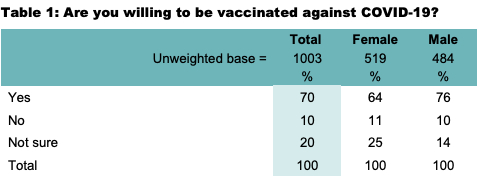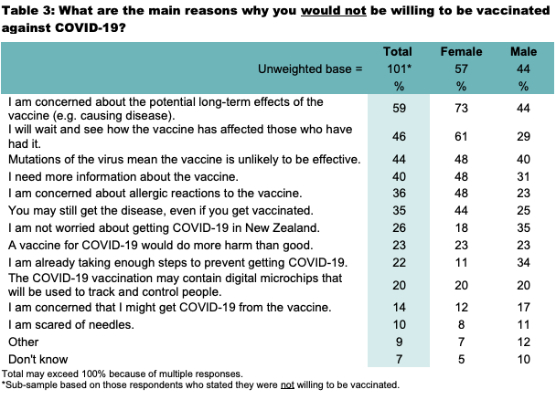New Zealanders Have Some Concerns Around COVID-19 Vaccinations
The topic:
As the Pfizer COVID-19 vaccine has been provisionally approved for use in New Zealand, we thought it would be timely to look at New Zealanders’ Covid behaviour and whether they are willing to be vaccinated against COVID-19.
Our first poll for 2021 surveyed n=1,003 New Zealanders, 18 years of age and over was completed between 4 and 7 February 2021. We asked two questions in order to:
- Measure whether New Zealanders are willing to be vaccinated against COVID-19, and their reasons why, or why not.
- Gauge whether New Zealanders are following recommended health guidelines to avoid the spread of COVID-19.
The questions were introduced as follows:
The Pfizer COVID-19 vaccine has been provisionally approved for use in New Zealand (for those over 16 years), with initial batches expected to arrive by the end of March.
The Prime Minister Jacinda Ardern has said those most at risk of contracting COVID-19 would receive the vaccine first, with the broader community vaccination rolled out from the middle of this year.
The main findings of this poll are:
Willingness to be vaccinated is relatively low:
- Overall, seventy percent of respondents stated they were willing to be vaccinated against COVID-19, ten percent were not willing to be vaccinated, and twenty percent were unsure.
- Those willing to be vaccinated (n=696) indicated their main reasons were that the vaccination is the best way to protect themselves (69%), and others (67%) from COVID-19.
- Those unwilling to be vaccinated (n=101) reported their main reasons were concern about the potential long-term effects of the vaccine (59%) and wanting to wait and see how the vaccine has affected those who have had it (44%).
Just two-thirds regularly use a tracking app, and fewer use face masks on public transport:
- Relatively high percentages of New Zealanders stated they wash their hands frequently (92%), always practice safe coughing and sneezing (88%), and always stay home when they are unwell (87%).
- However, relatively lower percentages reported other ‘keeping safe’ behaviours:
Officials and experts have recently encouraged New Zealanders to use tracking apps. However, just over two-thirds of all respondents stated they always keep track of where they’ve been (through the NZ Covid Tracer app or keeping a record of your visits).
This survey was undertaken while New Zealand is at Alert Level 1 and the use of masks or face coverings is mandatory for people travelling on passenger flights throughout New Zealand, and people travelling on public transport services in, into and out of the Auckland region (and the drivers of small passenger service vehicles in Auckland). Three-fifths of all New Zealanders said they always wear a mask on public transport (57%), although this was 82% of Aucklanders.
Aucklanders are above average in terms of their ‘keeping safe’ behaviours:
In comparison to all respondents across the country, Aucklanders more frequently stated they:
- Always wear a mask on public transport (82% compared with 57% for all respondents).
- Always keep track of where they've been (76% compared with 68% of all respondents).
Key results
Willingness to be vaccinated against COVID-19
Overall, seventy percent stated they were willing to be vaccinated against COVID-19, ten percent were not willing to be vaccinated, and twenty percent were unsure.
There was a significant difference between females and males:
- Significantly fewer female respondents reported they were willing to be vaccinated with under two-thirds willing (64%) compared to over three-quarters of males (76%).
- The difference is due to a higher level of uncertainty amongst female respondents with a quarter not sure if they would be willing to be vaccinated (25%) compared to 14% of males.

Key results: Reasons for willingness to be vaccinated against COVID-19
Respondents who stated they were willing to be vaccinated were asked what the main reasons are for their willingness to be vaccinated. The key results are as follows:
- Over two-thirds stated it (being vaccinated) is the best way to protect themselves (69%) and others (67%) from COVID-19.
- Around three-fifths said we need to vaccinate a high percentage of the population (70- 80%) to achieve herd immunity (61%) and the benefits of having the vaccination outweigh any downsides (57%).
- Half were willing to be vaccinated because if enough people get vaccinated, it will help us to re-open our borders (54%), they trust the NZ government officials' COVID-19 advice (53%), New Zealand's economic recovery will be quicker, if we all get vaccinated (49%), and COVID-19 is mutating and likely to get worse (47%).
- Older respondents (aged 55+) were significantly more likely than younger people to agree with all the reasons to be vaccinated that were presented. Please refer to Table 2 overleaf.
Female respondents were more likely than males to say they were willing to be vaccinated because:
- It's the best way to protect myself from COVID-19 (74%) compared to 64% for males.
- COVID-19 is mutating and likely to get worse (54%) compared to 42% for males.
Key results – Main reasons for unwillingness to be vaccinated against COVID-19
Respondents who stated they were not willing to be vaccinated (n=101), were asked the main reasons why. The key results are as follows:
- Three-fifths of those not willing to be vaccinated against COVID-19 stated they were concerned about the potential long-term effects of the vaccine (59%). Half (46%) will wait and see how the vaccine has affected those who have had it, and slightly less (44%) thought mutations of the virus mean the vaccine is unlikely to be effective.
- Around two-fifths stated they need more information about the vaccine (40%), they are concerned about allergic reactions to the vaccine (36%), and that you may still get the disease, even if you get vaccinated (35%).
- There were several significant gender differences (please refer to Table 3 below):
- Female respondents were significantly more likely than males to state they would not be willing to be vaccinated because they:
Are concerned about long-term effects of the vaccine at 73% (compared to 44% of males).
Will wait and see how the vaccine has affected those who have had it at 61% (compared to 29% of males).
Are concerned about allergic reactions to the vaccine at 48% (compared to 23% of males).
- Males were significantly more likely than females to state they would not be willing to be vaccinated, because they are already taking enough steps to prevent getting COVID-19 at 34% (compared to 11% of females).

Key results – whether New Zealanders are following COVID-19 safety guidelines.
The key results are as follows on Table 4.
There are some significant gender differences:
Males were significantly more likely to have reported they were willing to be vaccinated against COVID-19 at 76% compared to 64% of females.
Female respondents were significantly more likely than males to have stated they:
- Always stay home when they are unwell at 90% compared to 84% of males.
- Regularly clean surfaces that get touched frequently at 74% compared to 65% of males.
Older respondents (aged 55+) were significantly more likely than younger respondents to have reported that they:
- Wash their hands frequently at 96% (compared to 88% of 18-34 year olds and 91% of 34 to 54 year olds).
- Always stay home when they are unwell at 95% (compared to 81% of 18-34 year olds and 84% of 34 to 54 year olds).
- Always keep track of where they’ve been (through the NZ Covid Tracer app, or keeping a record of your visits) at 76% (compared to 66% of 18-34 year olds and 61% of 34 to 54 year olds).
Comment:
“While the majority of New Zealanders appeared willing to be vaccinated against COVID-19 at 70%, according to experts this is probably not enough to develop herd immunity and protect our communities. These results show that almost a third will require more information about the long-term safety of the vaccine, before being willing to be vaccinated themselves. This is concerning as not everyone is always following the COVID-19 safety guidelines to prevent the spread of the virus."
"The results also revealed some interesting gender differences. Less than two-thirds of women were willing to be vaccinated compared to three-quarters of men. Women reported more concern about potential long-term effects and allergic reactions from the COVID-19 vaccine, while some men reported they are doing enough already. Perhaps women are more cautious, or men more confident? This could be an interesting debate - but does indicate that the public require more information and clear communication about the safety of the COVID-19 vaccine.”
Research New Zealand Managing Partner, Emanuel Kalafatelis.


 E tū: Bupa Roster Changes Put Residents And Caregivers At Risk
E tū: Bupa Roster Changes Put Residents And Caregivers At Risk Democratic Voice of Burma: The Resilience And Hope Of Myanmar’s People On Screen In Auckland Sat April 5
Democratic Voice of Burma: The Resilience And Hope Of Myanmar’s People On Screen In Auckland Sat April 5 NZSEG: Powering The Future - NZSE College And Royal New Zealand Navy Forge Educational Partnership
NZSEG: Powering The Future - NZSE College And Royal New Zealand Navy Forge Educational Partnership Courtney Duncan: Illness Prevents Duncan From Contesting First Round Of 2025 World Women’s Motocross Championship
Courtney Duncan: Illness Prevents Duncan From Contesting First Round Of 2025 World Women’s Motocross Championship GPNZ: Extended Skill Mix In Primary Care Teams Improves Patient Access And Outcomes
GPNZ: Extended Skill Mix In Primary Care Teams Improves Patient Access And Outcomes New Zealand Symphony Orchestra: Music Legend To Conduct Bach, Beethoven And Mozart With NZSO
New Zealand Symphony Orchestra: Music Legend To Conduct Bach, Beethoven And Mozart With NZSO